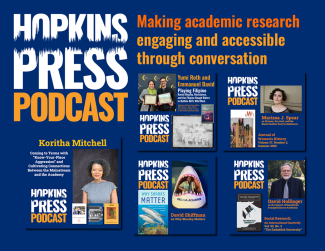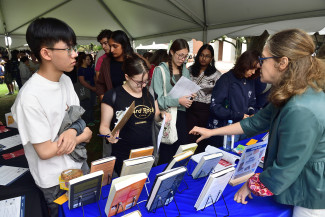
Johns Hopkins UniversityEst. 1876
America’s First Research University
Happy Open Access Week

![]()
Who doesn’t love something for free? Free speech? Free Wi-Fi? Free beer? In celebration of the Tenth Open Access Week, I’ll throw in free scholarship. Yes, books and journals for free. No catch. Free. Take all you want. At Johns Hopkins University Press, we are committed to delivering impact for ideas, and now we’ll deliver selected content for free.
This might sound too good to be true, but through a generous grant from the National Endowment for the Humanities and the Andrew W. Mellon Foundation, this is exactly what we mean. This fall, we will make two hundred classic backlist books open to the world on Project MUSE. (Earlier this year we also made another hundred titles open access.) These three hundred will join hundreds of other books and journals openly available to discover, explore, download, and read.
The move to open scholarship was first sparked in the world of science journals. Research supported by public funds and performed at public universities, the argument goes, shouldn’t be locked away in journals available only to those who could afford subscriptions. Publicly-funded research should be available to the public. Over time, the OA movement has expanded to some journals in the social science and humanities. It was only a matter of time before some called for scholarly books to be open as well.
Surprisingly, there are a remarkable number of challenges to giving something away for free. First, many of these older titles never existed in electronic forms. We had no e-book to give away. Because the NEH-Mellon grant was designed to resurrect out-of-print scholarship, we had to convert print books to digital ones. That’s not impossible if you actually have a copy of the print book. At Hopkins, we’ve been publishing since 1878, and although we have extensive archives, we don’t actually have copies of everything we’ve published. This meant hunting around used book stores and online shops for original versions of these books. Sometimes, we even borrowed old library copies for conversion.
Another challenge that you might not anticipate is a legal one. A book contract is a standard agreement between an author and publisher that gives the publisher the right to publish the book in exchange for a royalty on sales. Before the ready availability of electronic books in the late-1990s, those standard contracts were silent about digital rights—which hadn’t been invented yet. Further, although they allowed for the sale of those print books, they say nothing about giving them away for free. So, to make these books available digitally and for free, we needed the author’s permission to do so.
Now, tracking down a copy of an old book is one matter, and tracking down an author from a book from 1955 is quite another. In some cases, we had working addresses for those scholars, but in others we had to work with their estates to secure permissions. Our researcher for this, Will Krause, describes sometimes cold calling nursing homes to find elderly authors and even combing obituaries for the names of next of kin. It was an adventure in cyber-sleuthing.
The results have been worth it. We were able to secure the rights to launch these books back into the world in their new open and sustainable forms. Hopkins Open Publishing is proud to present—or re-present—these classic books in American and European history, literary criticism, philosophy, and political theory. All of this made possible because of the remarkable team of publishers, editors, researchers, librarians, productions specialists, marketers, data analysts, web developers, and, of course, the visionary people at the National Endowment for the Humanities and the Mellon Foundation.
So, join us over at Project MUSE, where you can celebrate Open Access Week with a free book and a digital piece of cake!
Greg Britton is Editorial Director at Johns Hopkins University Press. You can follow him on Twitter at @gmbritton.
View over 100 Open Access books from JHU Press at this link. Discover more about the project at our Open Access landing page.


